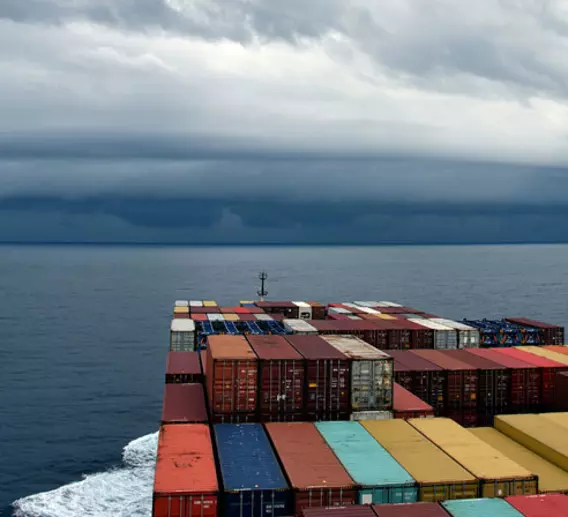What is “blank sailing” and why does it matter?
Blank sailing (also known as void sailing) is when a port, region or entire leg of a scheduled ocean sailing is skipped or cancelled. This can happen for a variety of reasons, but every cancellation can cause downstream impacts for international shippers. Learn why and how ocean liner services use blank sailings and what the impacts could be.
Reasons blank sailings occur
One of the most important things to know about blank sailings is they can be planned or unplanned. How much notice you receive depends on why the sailing is cancelled. Though exact circumstances vary, blank sailings are typically due to problems with the sailing schedule or because of fluctuations in the market.
Difficulties meeting the sailing schedule
Shipping lines have a set number of days to complete their sailings and each schedule comes with specific ETAs (Expected Times of Arrival) and ETDs (Expected Times of Departure) for each destination port. Adhering to the sailing schedule is essential for keeping containers flowing through the global supply chain, but it’s not always possible to meet every deadline. Shippers may see blank sailings for delays caused by:
Port issues
Congestion and labor shortages are two port issues that can cause blank sailings. In these instances, it often makes more sense for a vessel to skip a port rather than risk delays that will impact the rest of the sailing schedule. Port omissions may be known before booking if the event is ongoing — such as situations where ports were heavily congested or locked down during Covid restrictions — but can happen throughout the voyage if unexpected challenges arise.
Vessel complications
Though vessels undergo maintenance to help keep them seaworthy, mechanical problems can occur along the way. Some repairs can only be done at certain locations, which may mean rerouting or skipping ports that don’t have the ability to resolve the issue. Depending on how long repairs take, additional cancellations could be necessary to meet remaining port arrival times.
Inclement weather
Weather also can cause blank sailings if the vessel won’t be able to safely travel to or berth at a particular location. Some ports may even close if conditions make it unsafe to complete required processes. For example, if cranes can’t be operated due to high winds, the port could halt operations.
Changes in the market
Planned blank sailings are sometimes necessary to help control demand. When demand for cargo space is low, shipping lines often use blank sailings to help make their operations more efficient. By cancelling certain sailings, lines can consolidate shipments to use all available space on a vessel — a much more cost-effective approach than sailing multiple vessels with a lot of space remaining.
Blank sailings due to low demand frequently occur during holiday seasons like Lunar New Year, when factories shut down and outbound freight volumes decline from ports in Asia. Your carrier will be able to discuss historic patterns and current maritime market conditions to help you plan shipments accordingly.
What happens to the containers?
In most cases, containers that were supposed to be on a cancelled sailing will be loaded onto the next available vessel. However, if the situation is prolonged, some changes may be necessary to get your freight moving. Your logistics provider should make you aware of blank sailings as soon as they’re known and help implement a solution to get freight on track as quickly as possible. For some, that may mean switching to air freight or transporting shipments to or from another port.
Potential impacts of blank sailings
Blank sailings can present multiple challenges for shippers, including:
Inventory issues
Not receiving items on time could cause prolonged problems with inventory. Initially, you may have trouble keeping up with demand while waiting for a shipment to arrive, but issues can happen even after it’s delivered — especially if your freight volumes are seasonal. This could lead to an overstock of items you no longer need, which can limit the amount of available storage space.
Extra costs
Unexpected costs could arise from significant delays due to blank sailings. To start, any shipments that need to be moved to/from a port will require additional service fees. Another possible expense is detention and demurrage charges for filled containers held at a port past their allotted free days. Additionally, shipments containing perishable or temperature-sensitive goods could result in a total loss.
Reduced customer satisfaction
Delivering on your promises and keeping a good stock of products is key for keeping customers happy with your brand. Frequent shipping delays or consistent out-of-stock inventory could lead to loss of market share.
For these reasons, it’s important to fully communicate all details of the shipment with your international provider, so they can help mitigate risks.
Get support for your international freight
Keeping your global supply chain efficient requires an innovative approach and informed decision making. The ArcBest team can help execute a strategy that enables you to navigate challenges presented by blank sailings. As a fully integrated logistics provider, we can shift modes if necessary and provide ground expedite solutions to help speed up final delivery and meet customer demands.
Learn about our international service to see how we can support your supply chain.




